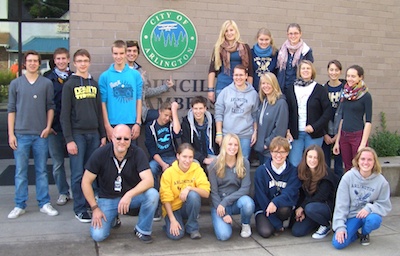ARLINGTON — For 11 years, Arlington High School has teamed up with the Moerike Gymnasium in Stuttgart, Germany, to broaden the horizons of students in both countries.
From Oct. 6 through Nov. 3, AHS and several of its students’ families played hosts to 19 students from Stuttgart, as they attended 10 days of school traveled to Deception Pass, spent a day in downtown Seattle, attended all of AHS’s Homecoming activities, from the parade and game to the dance, and stayed three days and two nights in Winthrop before exploring the Olympic Peninsula during four days and three nights in Port Townsend. The German students’ travels throughout the region even took them to the Hibulb Cultural Center on the Tulalip Indian Reservation.
Klaus Schellhaas, one of the English teachers from the Moerike Gymnasium, explained that he and AHS German teacher Ben Mendro trade off trips to each other’s countries every other year.
“When our students have to speak English here, they are not as afraid or hesitant in the language,” Schellhaas said. “They become more fluent. Quite a lot of cultural stereotypes are done away with as well, although some are confirmed,” he laughed.
Both Schellhaas and his fellow English teacher from the Moerike Gymnasium, Susanne Gruber-Knake, remarked upon the how “overwhelming” they still found the American landscape, even after returning to it for a number of years.
“We hardly have any national parks left,” Schellhaas said.
“We only have a little bit of coastline left up north,” Gruber-Knake said.
Like many of her fellow Stuttgart students, this trip marked Sophie Bergemann’s first time in America, and the 16-year-old marveled at the sizes of what America had to offer.
“Everything is huge here and looks like it does in the films,” Bergemann said.
“You see it in the size of the streets and the trucks,” said Franziska Detering, 15, one of Bergemann’s fellow students at the Moerike Gymnasium. “We don’t even have trucks in Germany.”
Like their teachers, Bergemann and Detering were struck by the lushness of the state’s rainforests, with fellow Stuttgart student Vera Jackisch, 16, chiming in to compliment its oceanside beaches.
“There’s a lot of different types of landscape here,” Bergemann said. “It can feel strange to be in a foreign country, but it’s not scary. Most people understand you.”
“Everyone is so friendly,” Jackisch said. “Everyone talks to you.”
The German teens were a bit more apprehensive about their first Halloween in America. While Germany observes a much simpler form of the custom, almost exclusively for small children, the German teens were surprised to see so many houses decorated so elaborately for the occasion.
“The lanterns and fake spiderwebs were everywhere,” Jackisch said.
“It’s a very American cliche,” Detering said, recalling the American horror films she’d seen.
Homecoming, on the other hand, was a completely new custom to the German students, with Bergemann describing it as “like a carnival, where everyone is excited and going a little crazy.”
The students turned solemn as they reflected on what they’d learned from the Hibulb Cultural Center.
“The Indian culture is not like the movies we see,” said Julian Kimmig, 16.
“They’re trying to save their culture,” Bergemann said. “It’s difficult, because things are changing a lot. We don’t have an equivalent to that.”
While Jackisch looked forward to eating German meals again at home again, with Bergemann noting that Americans add a bit too much sugar to their foods for her tastes, they all agreed they would miss their host families and Arlington High School itself.
“I’ll miss football too,” Bergemann said. “Now that I’ve gotten used to it, I know how the game works.”
“There are always tears when it’s time to go,” Gruber-Knake said. “Through this experience, they can understand the different ways of the world, and why they are so.”







